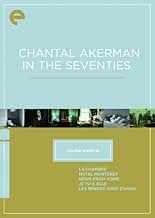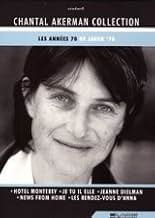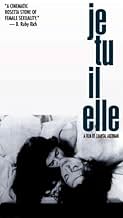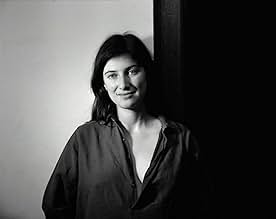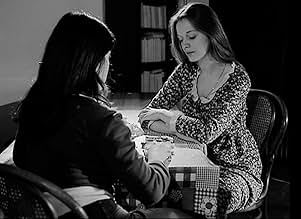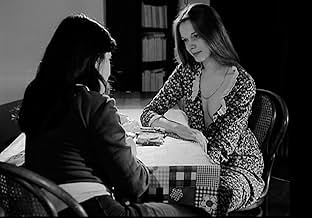Adicionar um enredo no seu idioma'Je' is a girl voluntarily lock up in a room. 'Tu' is the script. 'Il' is a lorry driver. 'Elle' is the girlfriend.'Je' is a girl voluntarily lock up in a room. 'Tu' is the script. 'Il' is a lorry driver. 'Elle' is the girlfriend.'Je' is a girl voluntarily lock up in a room. 'Tu' is the script. 'Il' is a lorry driver. 'Elle' is the girlfriend.
- Direção
- Roteiristas
- Artistas
- Direção
- Roteiristas
- Elenco e equipe completos
- Produção, bilheteria e muito mais no IMDbPro
Avaliações em destaque
Je, Tu, Il, Elle tells a story of a woman under the verge of a nervous breakdown. She just had been broken up with. Unable to literally move, she begins a slow journey to healing. In between, she eats a pack of sugar, begin a handy relationship with a driver she'd hitchhiked with and ultimately returns to her former lover's embrace.
A very interesting film. I always hear about Akerman when I reading about top women directors. But She has always been elusive since reports about her works describe it as minimalistic, repetitive and still. Things I tend to have reservation, but this is a RESPECTED DIRECTOR in bold letters.
This film proves that acclaim.
Everything is such a choice but it works. Directing and acting in what seems to be a very introspective and highly personal work, with all the bared. Quirky yet smartly written narrative that is complimented by her marvellous camerawork,and lighting. Everything here just is in full gears. She was able to encapsulate the trapped feeling of being depressed in such a tight package without any preachiness. And for a slow cinema style, she knows when to shift gear and engage her audience.
I am very excited to watch her other works.
Overall, highly recommended.
As a fan of long static shots I might not have had as big trouble as some others seems to have had. But the beauty of the imagery was minimal. And the lesbian love scene in contrast less grey felt not only dead but entirely inhuman and distant.
The 30 minute opening act was though it's many attempt of humor more or less dull. Her inner dialog struck me as somewhat silly rather than funny, interesting and deep. My interest grew during the second act, which is more dialog driven than the first and the last.
If anything this is a revolt against form. And I can in some sense appreciate it for this. Anything new or different will obviously create some interest and start some sparks. But Akerman did not manage to bring me in with this one.
(The surface of the film extremely resembles Stranger Than Paradise by Jim Jarmusch, completed in 1983; the two films share the three-episode plot and the B/W medium shots by the fixed camera without panning/tilting/dollying. But this may be irrelevant for viewing this Akerman film.)
Akerman plays Julie, though we're never revealed that is actually her name, and for the first half hour of this 86 minute film, she's in her room. That's it. She writes a letter, or a few letters, rewrites them, moves around furniture, eats sugar, eats more sugar, spill some sugar and spoon by spoonful puts the sugar back in the brown bag, and then gets naked and roams around the room. You might have heard the expression with an "art-house" film that it's "like watching paint dry." With this film, it's hard to exaggerate that claim enough. Shots last for minutes, and Akerman is often sitting either in obsessive detail of what she's doing, or not really doing anything at all, like in a trance, with her narration coming up dutifully explaining exactly what is happening or will happen on screen.
But if you stick with it, and being a fan of Jeanne Dielman I knew this was how Akerman likes to film in a patient poetic style, it starts to show a pattern. Julie isn't just doing nothing, but she's doing MUCH of nothing, obsessively, over and over, with the letters, the sugar, the furniture, her own body. And just when it's getting too long going, as if Akerman knows how the audience is feeling, Julie finally leaves the room. From here it becomes a two-part road trip. First she hitchhikes and is picked up by a truck driver. His scenes start slow, but at least there's more on the soundtrack (music, audio from a TV, other cars), and it leads up to an un-erotic but fascinating scene where the driver forces Julie to give a hand-job. He then gives a monologue about his wife and kids and driving while aroused. Why not? It's an amazing list of things said, and acted well enough.
The second part is the most surreal, but also the most heartfelt. Julie meets up with a Girlfriend at her place, and at first they eat. But then comes a very long scene of lovemaking. Again, do shots go on too long, or are they just right for the rhythm Akerman is reaching for? If you think the former, then probably you've already tuned out or turned off the film. For the latter, it is just about right, and by now Akerman has gone to a kind of alienating apex. It's hard to identify with Julie, but some of her concerns, like finding a place, people to love or be with, something to do worthwhile, do resonate, and the subtext is thick with ideas and methods. The approach is precisely feminist, much more so than anything else I can think of from the period, where the technique, the "performances" (vacant/naturalistic as they are), and the heart in its poetic intent speak about a woman's nature to be unsatisfied, and searching for something, a longing, a person, sex, anything. That it's Akerman herself in the role, often naked and open, is startling.
Você sabia?
- CuriosidadesThe film was ranked joint 225th in the Sight and Sound critics' poll of 2022.
- Citações
Truck-driver: You see, this is what matters. Move your hand. Slowly. Not so fast. Up and down. Slowly at first, then a little faster. I can feel it. It's getting warm. It's getting harder. It's filling up. Now the heat comes - inside and out. Slowly. It's gonna get real big and burst its skin. You obey, but you're afraid. You think it's wrong. Stroke it faster. Faster. Keep going. You can feel it coming. Go on. Go on. Slowly. That's right, up and down.
[Groans]
Truck-driver: It came in little waves. I'm gonna put my head on the steering wheel.
- ConexõesFeatured in Fabulous! The Story of Queer Cinema (2006)
- Trilhas sonorasNous n'irons plus au bois
(uncredited)
Traditional French
Lyrics by Madame du Pompadour
Music from the Gregorian 'Kyrie' of the "Mass of the Angels"
Principais escolhas
- How long is I, You, He, She?Fornecido pela Alexa
Detalhes
- Data de lançamento
- Países de origem
- Central de atendimento oficial
- Idioma
- Também conhecido como
- Je tu il elle
- Locações de filme
- Empresas de produção
- Consulte mais créditos da empresa na IMDbPro
- Tempo de duração1 hora 26 minutos
- Cor
- Mixagem de som
- Proporção
- 1.37 : 1
Contribua para esta página




